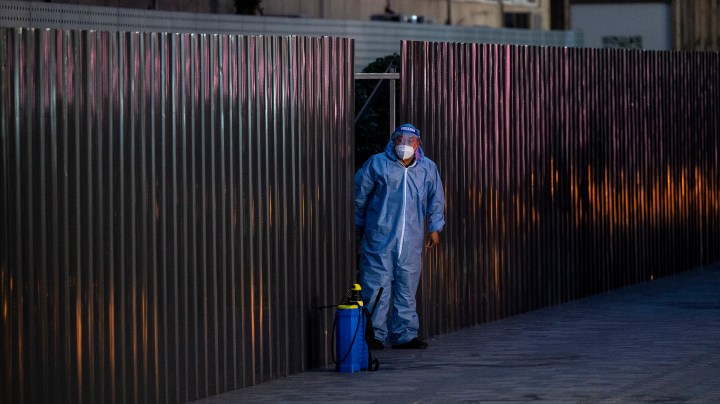
China’s lockdowns continue to disrupt personal lives and the global economy
China’s lockdowns continue to disrupt personal lives and the global economy

There are more than 70 cities in China that are under partial or full lockdown as China continues implementing its zero-COVID policy. Because of this, China’s residents continue to run short on food and have limited or no access to medical care.
“Marketplace” host Amy Scott spoke with Jennifer Pak, Marketplace’s China correspondent, about what life in China looks like and how these lockdowns continue to affect the global economy. The following is an edited transcript of their conversation.
Amy Scott: Can you start by telling us the difference between a full and a partial lockdown?
Jennifer Pak: So, a partial lockdown means an office block, a condo or entire districts could be sealed off if someone with COVID-19, their contacts, their contacts’ contacts happen to pass through. A full lockdown these days with the omicron variant means even food deliveries are stopped. But this is where you’re getting stories from cities currently under lockdown complaining that they’re going hungry.
Scott: Wow. And Jennifer, you’ve not only reported on life under lockdown, you’ve actually lived this when Shanghai was locked down for two months. Can you talk about what it was like just trying to get food?
Pak: Yeah, it was surreal. Because I had the money, I just couldn’t get what I wanted when I wanted it. So at one point, I paid $188 for a box of Italian cured meats because there was bacon in it. But then, of course, they messed up the order, and I was able to snack on gourmet salami, but no bacon. There was a convenience shop owner nearby me who ate nothing but instant noodles for weeks. And then the next question is, you know, when you get the food, how long do you make it last for? How do you make it last? And that’s the thing — nobody told us when it was going to end.
Scott: Well, just given all that, how are people holding up? I mean, are you seeing any resistance to these seemingly never-ending lockdowns?
Pak: We’re seeing spots of it. But it’s really tough to say nationally because of the very sophisticated censorship. I mean, we’re only just finding out now that there are places still in lockdown for well over a month in the Xinjiang region. People couldn’t go to the hospitals for treatment for non-COVID-related stuff. I mean, there was a joke — although not quite funny — that in the U.S., COVID is not an illness, but in China, only COVID is an illness.
Scott: Because people have actually died from lack of medical care, I’ve read.
Pak: Yeah, and pregnant women have miscarried because they didn’t have the right PCR tests to get into the hospital.
Scott: Well, for the economy, these lockdowns have obviously been extremely disruptive. What does this ongoing situation mean going forward?
Pak: Well, it means that China’s reforms to shift the economy from an export-led one to a consumption-based one has stalled. The zero-COVID policy no doubt in the beginning really helped Chinese factories get back up and running. I was back at the office within two months in Shanghai. And these factories, by the way, were able to turn out stuff for people here in the U.S. and the rest of the world when everything else was shut down. So that was good. But for Chinese consumers, it’s now two and a half years going on three, and they’re very reluctant to spend. All of their savings have depleted. And right now, COVID restrictions are ramping up.
Scott: With so many cities facing either full or partial lockdown, it’s got to affect the global supply chain.
Pak: Absolutely. And that’s why there are companies like Apple reportedly wanting to boost production elsewhere — say in India or Southeast Asia, which have already opened. And keep in mind, every city that has emerged from an omicron lockdown like Shanghai, they’re not the same. I mean, we have to consistently test at least every second day. And there’s that uncertainty about quarantine. And the worst of all, there is no off-ramp for this.
There’s a lot happening in the world. Through it all, Marketplace is here for you.
You rely on Marketplace to break down the world’s events and tell you how it affects you in a fact-based, approachable way. We rely on your financial support to keep making that possible.
Your donation today powers the independent journalism that you rely on. For just $5/month, you can help sustain Marketplace so we can keep reporting on the things that matter to you.












